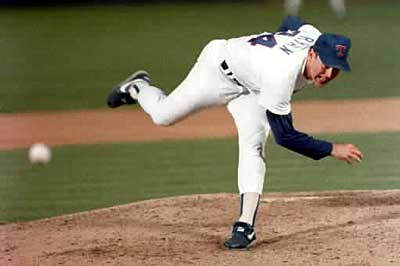It is a game that can be played by all--those from all races and ethnicities, from all socio-economic backgrounds, and all manner of physical shapes and sizes. From John Cangelosi to John Kruk, Rod Beck to Randy Johnson, and everyone in between, it is a game that requires, first and foremost, for its aspiring players to love what they do (and work hard at it) in order to have any inkling whatsoever of becoming successful.
The best players on the field are not always the ones who have been blessed with the most talent. Often times, the players who have the most enduring success in this great game do have one common trait--they all hustle.
"I'd walk through hell in a gasoline suit to play baseball."
-Pete Rose
"There is no substitute for hard work."
-Thomas Edison
"There is no substitute for hard work."
-Thomas Edison
 |
| Pete Rose--a.k.a "Charlie Hustle"--is MLB's all-time hit leader. |
Roll up your sleeves. Use a little elbow grease. Put your nose to the grindstone. Dig in your heels. Cinch it up and hunker down.
Whatever cliche you prefer, they all refer to a quality that is a must for leaders in the field of education: the desire to to the dirty work.
When was the last time you (the reader) took the time to ask one of your students what an average day is like for them? It's easy for us, as their teachers, to observe a student's behavior in terms of our daily interaction with them. Maybe we see Jenny every day during 9th period Law. Or we coach Sam every day in the spring on the baseball field. Or we work with Allison 2 or 3 times a week in the dean's office. Do we consider what's happening in the lives of our students during the 23 hours we don't see them?
Think back for a minute---being a high school student isn't as easy as we are sometimes guilty of telling our students it is. The last time I tried to sit in one of those desks, I needed a can of WD-40 to get out. We ask our students to do that 8 or 9 times a day, 180 days a year--and they had better PAY ATTENTION for every one of those 50 minutes they are in our presence! We give them a 5-minute passing period (or less), during which they are encouraged to use the facilities, hydrate, go to their lockers, and discuss any pending issues with their teachers...and they had better not be late to their next class. When the school day is over, they're encouraged to get involved. Many of them do. They're in student council and Key Club. They volunteer in soup kitchens and participate in Wrestling Boosters. They sing in the choir and start as the 2-guard on the basketball team.
For many students, it doesn't end there. There are jobs, often times that are required to help their families pay the bills. There are younger siblings to babysit. There are older relatives that require care. There are the demands to fill out college applications and scholarship proposals in the hopes of one day having the honor of owing over $100,000 in student loans.
Oh, and there's homework, too.
Please don't mistake the point of my message here. I'm not going to be at the front of the line lighting candles for the poor, unfortunate high school students of America. All I'm saying is that if we are demanding this type of dedication from our students, we owe it to them and to ourselves to put forth the same type of effort.
We need to hustle for our students.
Hustle can take on a lot of forms. It can mean many different things to many different professionals in our field, depending on the manner in which we interact with students on a daily basis.
It might mean staying after practice for 45 minutes 3 times a week to hit groundballs to that shortstop's backhand side. It could be taking the time to stop a student in the hall and tell her that you've noticed her grades improving, and calling home to notify her parents about her success. Maybe it's as simple as taking a couple of minutes to respond to that email from a young man who has a question about an assignment he's working on...right as your head is about to hit the pillow.
As a baseball coach, on the first day of tryouts, I deliver this message to all of the young men who are hopeful of one day donning the blue and gold "L" on their hats:
I have five days to find out if you can play baseball. It's the end of February, and our fields are covered with a foot of snow. In five days, I have to do whatever I can to determine if you can hit, bunt, run the bases, field ground balls, throw, catch a fly ball, hit the cut-off man, hit the outside corner with a 3-2 change-up, and be a good teammate. And I have to determine all of this in a gymnasium meant for many sports, none of which is baseball. In the end, though, there is one thing that you (the player) can control.
You can hustle. All the time. It will be noticed.
The fact is, the same applies to our students and their perceptions of us. They notice when we hustle. They appreciate it. They admire it.
And hopefully, they are inspired to do exactly the same.








